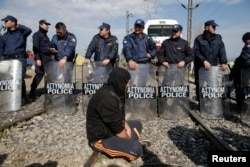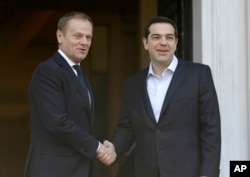European Council President Donald Tusk gave a stark warning Thursday to potential migrants thinking of traveling to Europe.
"I want to appeal to all potential illegal, economic migrants wherever you are from," Tusk said. “Do not come to Europe. Do not believe the smugglers. Do not risk your lives and your money; it is all for nothing. Greece or any other European country will no longer be a transit country."
Tusk spoke from Athens, where he met Greek Prime Minister Alexis Tsipras for emergency talks during a tour of nations grappling with the migrant crisis. He's preparing for an important EU-Turkey meeting on the subject in Brussels on Monday.
The United Nations estimates that more than half of the arrivals in Greece are fleeing war in Syria or Iraq and are legitimate refugees, rather than economic migrants.
The process of making that distinction is burdening resources, said Ian Bond of the London-based Center for European Reform.
"It's the sheer effort of trying to separate the legitimate refugees from those who are just economic migrants, which I think is really overwhelming the resources that Greece and its EU partners have been able to put into the problem at the moment," Bond said.
Night and day, on the main highway heading north through Greece, hundreds of migrants walk the last few kilometers toward the border with Macedonia. The frontier remains effectively closed as tightened border controls across the Balkans have had a ripple effect farther south. Only a few hundred refugees from Syria and Iraq are being allowed into Macedonia each day. Thousands of people are camped out at the frontier.
"I think, certainly, anger is building up," said Babar Baloch, spokesman for the United Nations' refugee agency. "People are very restless with families, with children, women, [because] they have been here for many days and there doesn't seem to be a resolution to this."
‘European consensus’
Speaking later Thursday at a joint news conference in Ankara with his host, Turkish Prime Minister Ahmet Davutoglu, Tusk said sending back illegal migrants would break the business model of smugglers who arrange sea crossings.
Tusk praised Turkey for its cooperation, including stepped-up coast guard patrols and a tightening of its visa program in handling the migrant influx.
Davutoglu said Turkey and Greece cannot be expected to carry the burden of the migration crisis by themselves.
Tusk agreed, earlier calling for European consensus and warning against division in the face of the severest migrant crisis since World War II.
"We must build a European consensus based on our joint decisions and rules," he said from Athens. "We must avoid divisions among us as they do not bring us any closer to a solution."
Tsipras, speaking with reporters, called for speeding up the process of relocating asylum-seekers.
"The European Union needs to acknowledge that Greece cannot carry all this burden alone ... So that there is a fair distribution [of the burden], we will demand that relocation from Greece is sped up immediately, and for the direct relocation of refugees who qualify for asylum to EU countries from Turkey," he said.
Greece, a popular entry point for migrants, was already in a tight financial situation before the migrant crisis began. Greece has asked for more than $500 million from the European Union to help it handle expenses.
‘Weaponizing’ the crisis
Many Syrians say they have fled airstrikes carried out by government forces and their Russian allies. NATO's Supreme Commander in Europe, U.S. General Philip Breedlove, has warned that Moscow is, in his words, "weaponizing" the refugee crisis.
"It is quite clear that Russia is exploiting the refugee crisis to divide Europe," said Bond, of the reform center.
Meeting Thursday in northern France, the French and British leaders said they would pressure Moscow to end its attacks against Syrian civilians and the moderate opposition during a conference call with Russian President Vladimir Putin scheduled for Friday. A shaky cease-fire in Syria appears to be largely holding.






